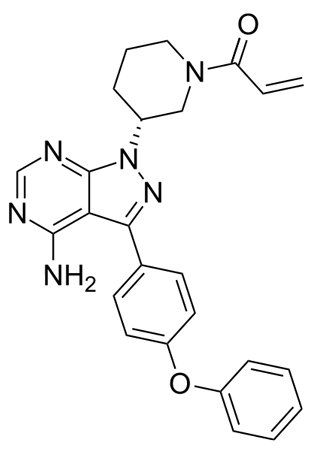Ibrutinib Shows Huge Benefit Over Ofatumumab in CLL and SLL
Ibrutinib substantially increased progression-free survival and overall survival over ofatumumab in patients with chronic lymphocytic leukemia (CLL) and small lymphocytic lymphoma (SLL), according to the results of the RESONATE trial.
Chemical structure of ibrutinib

Ibrutinib substantially increased progression-free survival (PFS) and overall survival (OS) over ofatumumab in patients with relapsed and refractory chronic lymphocytic leukemia (CLL) and small lymphocytic lymphoma (SLL), according to the results (abstract LBA7008) of the RESONATE trial presented by John C. Byrd, MD, of the Ohio State University Comprehensive Cancer Center in Columbus, Ohio, at the American Society of Clinical Oncology (ASCO) Annual Meeting, held May 30–June 3 in Chicago.
“Patients with CLL and SLL who experience a very short response duration to initial therapy, who are elderly, or who have deletion 17p, have poor outcomes and limited treatment options,” said Byrd. Ibrutinib is currently approved for mantle cell lymphoma and CLL in patients who have received at least one prior therapy.
The phase III RESONATE trial enrolled 195 patients in an ibrutinib arm and 196 in an ofatumumab arm between June 2012 and April 2013. All patients had at least one prior line of therapy; were considered inappropriate for treatment with purine analogues; and had an Eastern Cooperative Oncology Group (ECOG) performance status of 0 or 1, measurable lymph node disease, and adequate liver function.
The primary endpoint of PFS was highly significant; the median was 8.1 months in the ofatumumab arm and it was not reached in the ibrutinib arm, yielding a hazard ratio (HR) of 0.215 (95% confidence interval [CI], 0.146–0.317; P < .0001). Every subgroup analyzed showed similar and substantial benefit with ibrutinib.
The median OS was not reached in either group, but was still significantly better in the ibrutinib arm, with an HR of 0.434 (95% CI, 0.238–0.789; P = .0049). Byrd noted that this was particularly impressive given that ofatumumab patients were allowed to cross over to ibrutinib after an interim analysis, and 57 did so after confirmed disease progression. The OS was an intention-to-treat analysis and remained significant in favor of ibrutinib in spite of the crossover.
The response rate was 63% with ibrutinib, and 32% had stable disease, compared with only 4% response and 78% stable disease with ofatumumab. Some side effects were more common with ibrutinib, including diarrhea (48% vs 18%) and pyrexia (24% vs 15%). Ten patients on ibrutinib had atrial fibrillation compared with only one on ofatumumab, but this led to discontinuation of the drug in only one patient. There was no difference in major bleeding events between the groups.
Session discussant Nicole Lamanna, MD, of Columbia University Medical Center in New York, said that clinicians and future trials should be aware of the increase in atrial fibrillation. Still, she said, “this study represents a treatment paradigm shift for patients with relapsed CLL.”